|
|
|
Sort Order |
|
|
|
Items / Page
|
|
|
|
|
|
|
| Srl | Item |
| 1 |
ID:
117015
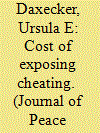

|
|
|
|
|
| Publication |
2012.
|
| Summary/Abstract |
This article investigates the relationship between international election observation, election fraud, and post-election violence. While international electoral missions could in principle mitigate the potential for violence by deterring election fraud, the ability of international observers to detect manipulation may in fact induce violent uprisings. Serious irregularities documented by international observers provide credible information on election quality, which draws attention to election outcomes and alleviates coordination problems faced by opposition parties and society. When elections are manipulated to deny citizens an opportunity for peaceful contestation and international observers publicize such manipulation, violent interactions between incumbents, opposition parties, and citizens can ensue. Consequently, the author expects that fraudulent elections monitored by international organizations will have an increased potential for subsequent violence. This expectation is evaluated empirically in an analysis of post-election conflict events for African elections in the 1997-2009 period. Using original data on electoral manipulation and reputable international election observation missions, findings show that the presence of election fraud and international observers increases the likelihood of post-election violence. Matching methods are employed to account for the possibility that international observers' decisions to monitor elections are endogenous to the occurrence of violence in the electoral process. Results for matched samples confirm the findings in the unmatched sample. A variety of robustness tests show that the results are not influenced by the operationalization of independent variables and influential observations.
|
|
|
|
|
|
|
|
|
|
|
|
|
|
|
|
| 2 |
ID:
178722
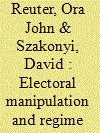

|
|
|
|
|
| Summary/Abstract |
Does electoral fraud stabilize authoritarian rule or undermine it? The answer to this question rests in part on how voters evaluate regime candidates who engage in fraud. Using a survey experiment conducted after the 2016 elections in Russia, the authors find that voters withdraw their support from ruling party candidates who commit electoral fraud. This effect is especially large among strong supporters of the regime. Core regime supporters are more likely to have ex ante beliefs that elections are free and fair. Revealing that fraud has occurred significantly reduces their propensity to support the regime. The authors’ findings illustrate that fraud is costly for autocrats not just because it may ignite protest, but also because it can undermine the regime’s core base of electoral support. Because many of its strongest supporters expect free and fair elections, the regime has strong incentives to conceal or otherwise limit its use of electoral fraud.
|
|
|
|
|
|
|
|
|
|
|
|
|
|
|
|
| 3 |
ID:
145647
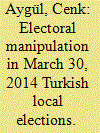

|
|
|
|
|
| Summary/Abstract |
This article examines the effects of law no 6360 legislated by the Adalet ve Kalkınma Partisi (AKP) before March 2014 local elections in Turkey. The law created 14 new metropolitan municipalities and greatly expanded 14 existing ones. It manipulated the elections first by adding all non-urban districts that were within the administrative borders, and second by dissolving all villages and towns by merging them with metropolitan municipalities. Analyzing the mayoral and councilor competitions, this article models how the elections would have ended had they been held within the pre-6360 borders, and concludes that election results were significantly altered because of distorted representation introduced by the law. Law no 6360 not only created advantages for AKP, but more importantly, it significantly weakened the main opponent Cumhuriyet Halk Partisi.
|
|
|
|
|
|
|
|
|
|
|
|
|
|
|
|
| 4 |
ID:
190408
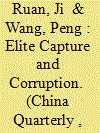

|
|
|
|
|
| Summary/Abstract |
This article presents a qualitative empirical study of elite collusion and its influence on village elections and rural land development in China. Drawing on ethnographic data collected from two Chinese villages, it investigates how village cadres collude with other rural elites, using bribery, gift-giving and lavish banquets, to establish reciprocal ties with township officials and other public officials. Meanwhile, the officials make use of formal organizations to corruptly obtain profits and form alliances with village elites. The article examines how rural elites, especially village cadres, use this collusion to profit from the misuse of villagers’ collectively owned assets, the manipulation of village elections and the suppression of anti-corruption protests. It also offers new descriptive evidence of how recent reforms designed to strengthen the Party's overall leadership in rural governance may have actually facilitated elite capture and grassroots corruption.
|
|
|
|
|
|
|
|
|
|
|
|
|
|
|
|
| 5 |
ID:
168251
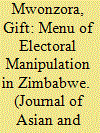

|
|
|
|
|
| Summary/Abstract |
Scholars have long been interested in investigating why and how ruling parties manipulate elections in Africa and elsewhere. Despite the importance of such a subject, much remains unknown about the role of incumbents in strategically manipulating electoral processes and outcomes in by-elections in particular. Debate rages on as to whether ruling parties rely exclusively on coercive methods or, in addition, make use of non-repressive methods. In seeking to contribute to addressing this matter, we draw upon a case study of two by-elections held in 2017 in rural constituencies in Zimbabwe, namely Bikita West and Mwenezi East. Our research involved evidence gleaned through personal observations, review of grey literature and personal reflections. Our study established that competitive authoritarian regimes as found in Zimbabwe combine both methods when manipulating by-elections. However, we show that there has been a shift away from heavy reliance on organised acts of naked political violence on the part of the ZANU-PF ruling party since the disputed 2008 elections and in the subsequent 2013 and post-2013 by-elections. Thus, there appears to be an inclination towards the use of subtle methods, including patronage, assisted voting, use of traditional leadership and appealing to the rendition of past violence. Nonetheless, even these methods impinge on the credibility of not only by-elections but also national elections in Zimbabwe.
|
|
|
|
|
|
|
|
|
|
|
|
|
|
|
|
| 6 |
ID:
168521
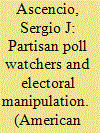

|
|
|
|
|
| Summary/Abstract |
How do parties protect themselves from electoral manipulation? To answer this question, we study the drivers of polling station party representatives’ presence and their impact on electoral outcomes in an environment where electoral irregularities are common. Using election data from the Mexican Chamber of Deputies, we find a robust positive correlation between the presence of party representatives and that party’s vote share. The evidence suggests that this correlation can be attributed to party representatives influencing the electoral results. We also formulate a game theoretic model of the levels of representation chosen by parties in a given precinct and structurally estimate its parameters. We find that parties send their representatives where they expect their opponents to send their own. The finding suggests representatives play a primarily protective role, even when they are often involved in irregularities themselves.
|
|
|
|
|
|
|
|
|
|
|
|
|
|
|
|
| 7 |
ID:
172242
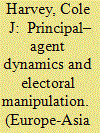

|
|
|
|
|
| Summary/Abstract |
Why are some elections manipulated more severely than others, and why do the techniques used to manipulate them vary over time and space? This article addresses these related questions by showing that patronage resources—not incumbent popularity—make manipulation appealing to frontline agents, while local political conditions can make manipulation personally risky for them. Agents can mitigate these risks by adopting more dispersed forms of manipulation like vote-buying, rather than more centralised falsification. These hypotheses are tested using forensic analysis of electoral data from more than 90,000 precincts per election across Russia’s 83 regions, from 2003 to 2012.
|
|
|
|
|
|
|
|
|
|
|
|
|
|
|
|
| 8 |
ID:
178789
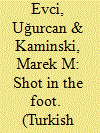

|
|
|
|
|
| Summary/Abstract |
The ruling party in Turkey, the AKP, made an ex post mistake by changing the electoral law before the parliamentary elections in 2018. The new apparentement provision allowed parties to make electoral alliances and the alliances’ total votes could then be used to meet the threshold. Surprisingly, the MHP met the threshold in the election, while one opposition party, the İP, failed to do so. AKP lost the parliamentary majority as a result. We estimate election results using four alternative scenarios, identify all parties that made ex post mistakes in supporting electoral reform, and evaluate the reform’s political consequences.
|
|
|
|
|
|
|
|
|
|
|
|
|
|
|
|
| 9 |
ID:
170811
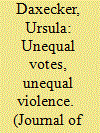

|
|
|
|
|
| Summary/Abstract |
Elections held outside of advanced, industrialized democracies can turn violent because elites use coercion to demobilize political opponents. The literature has established that closely contested elections are associated with more violence. I depart from this emphasis on competitiveness by highlighting how institutional biases in electoral systems, in particular uneven apportionment, affect incentives for violence. Malapportionment refers to a discrepancy between the share of legislative seats and the share of population, violating the ‘one person, one vote’ principle. Drawing on recent work on malapportionment establishing that overrepresented districts are targeted with clientelist strategies, are more homogenous, and are biased in favor of district-level incumbent parties, I argue that overrepresented districts present fewer incentives for using violence. In contrast, elites in well-apportioned or underrepresented districts exert less control over electoral outcomes because such districts have more heterogenous voter preferences, raising incumbent and opposition demands to employ violence. I examine the effects of malapportionment on violence using constituency-level elections data and new, disaggregated, and geocoded event data on the incidence of election violence in India. Results from six parliamentary elections from 1991 to 2009 show that electoral violence is less prevalent in overrepresented constituencies, and that violence increases in equally apportioned and moderately underrepresented districts. The analysis establishes additional observable implications of the argument for district voter homogeneity and incumbent victory, accounts for confounders such as urbanization and state-level partisanship, and validates measures of election violence. The findings illustrate that institutional biases shape incentives for electoral violence.
|
|
|
|
|
|
|
|
|
|
|
|
|
|
|
|
|
|
|
|
|